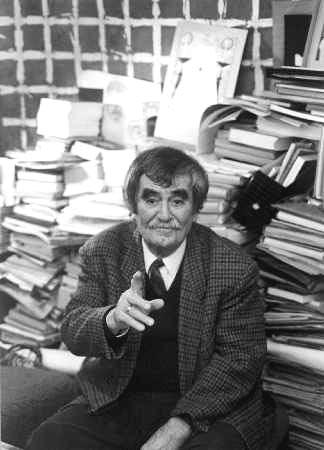Juhász Ferenc: Biography
Ferenc Juhász (Bia, 16 August 1928 – Budapest, 2 December 2015)
Two-time Kossuth Prize and Attila József Prize-winning poet and editor, awarded the title of Artist of the Nation. Founding member of the Digital Literature Academy from 1998 until his death.
*
Born on 16 August 1928 in Bia, a Hungarian-Swabian village near Budapest. His father, also Ferenc Juhász, was a bricklayer who underwent lung surgery in 1932 and was unable to continue his trade. After the Second World War he was a cotton factory worker. He died of lung cancer in 1950. Juhász’s mother, Borbála Andresz, was a maid and day labourer. Juhász had two brothers, Gyula (1930–1993), a historian, and János (1932), who died at just ten months old.
Juhász completed four grades of elementary school in Bia, attended the Roman Catholic school from 1934 to 1938, the civil school in Bicske from 1938 to 1942, and from 1942 to 1946 studied at the Kossuth Lajos Commercial High School in Budapest. After graduation, he enrolled at Pázmány Péter University, majoring in Hungarian and Sanskrit. In 1947, he became a factory worker at the French-Hungarian Cotton Industry Works, and in August 1948 he became a member of the Attila József People’s College in Budapest, continuing his university studies from the autumn of 1948. At the college he met Erzsébet Szeverényi, whom he married on 14 December 1948. His wife was a teacher and literary historian. She committed suicide on 14 December 1972. They had one daughter (Katalin, 1951).
Juhász left university after his first semester. His wife’s parents were declared kulaks in 1948, and his father-in-law was sent to the Csillag Prison in Szeged, where he remained until 1955.
His first two poems, „Gold” and „Silver” („Arany” and „Ezüst”), were published in the Christmas edition of Diárium. His first book of poetry was published in 1949, and that same year he received the Baumgarten Prize. Until 1951 he worked at the Book Office and the Lectorate of the Hungarian Writers’ Association, and from 1 December 1951 to 1974 he was editor of Szépirodalmi Publishing House. From 1946 to 1956 he was a member of the MKP (Hungarian Communist Party) and the MDP (Hungarian Workers’ Party).
In 1950 he was awarded the Attila József Prize for his book The Sántha Family (A Sántha család). Also in 1950 he became a board member of the Hungarian Writers’ Association. In 1951 he was awarded the Kossuth Prize silver award for his poem „My Father” („Apám”). However, his poetry soon came under sustained attack. In 1954, his epic long-poem, „The Prodigal Country” („Tékozló ország”), was published. In 1955–56, he became the leading poet of Új Hang (New Voice) with poems such as „The Boy Who Changed Into a Stag – Deer Songs” („A szarvassá változott fiú – Szarvas-ének”).
He was in Budapest during the 1956 revolution and the subsequent days of Soviet suppression. From 1957 onwards, he sank into a deep depression and was hospitalised. In 1960, at the invitation of the British Council, he spent three weeks in England. From there he went to Paris, where, after twelve years, he again met his friend and mentor, the painter Simon Hantaï.
In 1975–1976, he was nominated for the Nobel Prize. In 1971 he was awarded the Miklós Radnóti Grand Prize, and in 1973 he was again awarded the Kossuth Prize.
After 1956, the publication of his first new volume, Fight with the White Sheep (Harc a fehér báránnyal), was banned by the authorities until 1965, and one of the poems in it – „The Tomb of Attila József” („József Attila sírja”) – again provoked fierce attacks on him. After 1965, however, all his volumes were published by the Szépirodalmi Publishing House, and between 1978 and 1980 a collection of all his poetry was published.
In 1960, two collections of his poems were published in English: the first volume by Penguin, and the second, a selection of his poetry, by Oxford Publishing House. His poetry books were also published in German, Finnish, Swedish, Polish, Lithuanian, Hebrew, Italian, French, Bulgarian, and Serbian. He received the Grand Prize of the Art Fund.
In 1978 he married Katalin Kilián, a doctor. They have two daughters, Eszter (1979) and Anna (1980).
After a long illness, he died in Budapest on 2 December 2015.
*
Ferenc Juhász’s beginnings, career, and entire life’s work were shaped by borderline situations. Not only was his village of dual nationality, but his family too was half Hungarian, half Swabian. He got his start in the coalition period following the Second World War, and as a poet he was born at a historic turning point. His poems only briefly connected to the folk ideals he inherited, and from 1954 onward he developed an individual creative world that broke the boundaries of the neo-avantgarde as much as the literary poetics of postmodernism. His sociological formula also points to a borderline situation: he rose from poverty, but was not content with expressing his own limited world; he longed for emancipation, the key to which, as his entire oeuvre attests, is universality and a cosmic vision.
After the regime change, he found himself in „no man’s land”. One of the intellectual perpetrators of the revolution of 1956, he was unable to write for a long time after the revolution and was the subject of controversy and accusations. His was a career apparently marked by serious internal and external conflicts. Ferenc Juhász was rarely a happy poet. His marginal position, which demanded great sacrifices, was a heavy burden, but was also his most precious legacy. It shaped his open-minded outlook on the world, an outlook which determined both his historical-social and poetic responses.
The biography was written by György Bodnár, translated by Benedek Totth and Austin Wagner.

